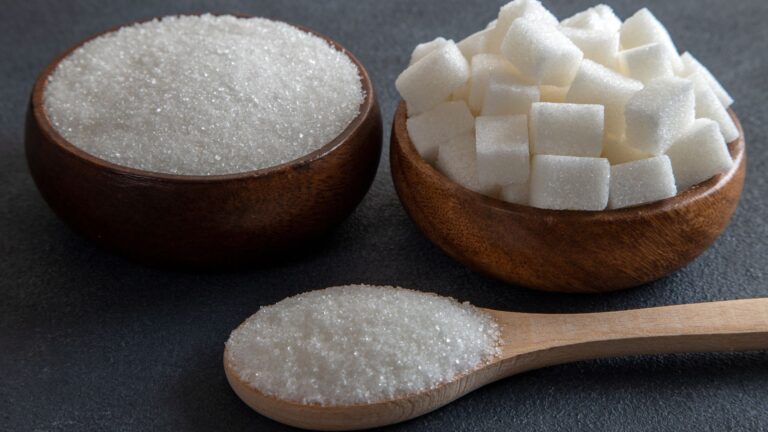In today’s world, sugar is everywhere. It’s not just in sweets and desserts, but also in sauces, beverages, and even savory foods. While a little sugar can be part of a balanced diet, excessive consumption can lead to health issues like weight gain, diabetes, and heart disease. Fortunately, there are practical and straightforward ways to reduce your sugar intake and embrace a healthier lifestyle. Here’s a guide to help you cut back on sugar with ten easy tips.

1. Understand Your Sugar Sources
Before you can effectively reduce your sugar intake, it’s essential to know where sugar is hiding in your diet. Sugar is often disguised under various names, including high-fructose corn syrup, cane sugar, and agave nectar.
Common Hidden Sources of Sugar:
- Processed foods: Many packaged snacks and convenience foods contain added sugars.
- Beverages: Soft drinks, fruit juices, and even flavored waters often have high sugar content.
- Condiments: Ketchup, salad dressings, and sauces can be surprisingly high in sugar.
2. Read Nutrition Labels Carefully
One of the most effective ways to manage your sugar intake is by becoming a label detective. Nutrition labels provide valuable information about the sugar content in packaged foods.
What to Look For:
- Total Sugars: Check the total amount of sugars per serving. The lower, the better.
- Added Sugars: Look for the amount of added sugars, which are sugars added during processing.
- Ingredient List: Identify different types of sugars listed in the ingredients, such as sucrose, glucose, or honey.
3. Choose Whole Foods Over Processed Foods
Whole foods, like fruits, vegetables, and whole grains, are naturally low in added sugars and high in nutrients. Incorporating more whole foods into your diet can help reduce your overall sugar consumption.
Benefits of Whole Foods:
- Natural Sweetness: Fruits contain natural sugars but are also rich in fiber, vitamins, and minerals.
- Reduced Sugar Cravings: Whole foods can help stabilize blood sugar levels, reducing cravings for sugary snacks.
4. Opt for Unsweetened Alternatives
Many products come in both sweetened and unsweetened versions. Choosing unsweetened options can significantly reduce your sugar intake.
Unsweetened Options to Try:
- Milk Alternatives: Almond milk, coconut milk, and soy milk often come in unsweetened varieties.
- Yogurt: Opt for plain yogurt instead of flavored versions, and add fresh fruit for natural sweetness.

5. Cut Back on Sugary Beverages
Sugary beverages are a major source of added sugars in the diet. Cutting back on these drinks can have a significant impact on your overall sugar intake.
Tips for Reducing Sugary Beverages:
- Replace with Water: Drink water or flavored water with a splash of lemon or lime.
- Try Herbal Teas: Unsweetened herbal teas can be a refreshing alternative to sugary drinks.
- Limit Juice Intake: Opt for whole fruits instead of fruit juices, which can be high in sugar.
6. Use Natural Sweeteners Wisely
While it’s important to cut back on refined sugars, using natural sweeteners can be a healthier alternative in moderation. However, even natural sweeteners should be used sparingly.
Natural Sweeteners to Consider:
- Stevia: A plant-based sweetener with zero calories and a low glycemic index.
- Maple Syrup: Contains some minerals and antioxidants but should still be used in small amounts.
- Honey: A natural sweetener with potential health benefits, but it’s still high in sugar.
7. Make Your Own Snacks and Meals
Preparing your own snacks and meals gives you complete control over what goes into your food, allowing you to avoid hidden sugars and additives.
Healthy Homemade Snack Ideas:
- Fresh Fruit: Apples, berries, and bananas make for quick and nutritious snacks.
- Vegetable Sticks with Hummus: A satisfying and healthy alternative to sugary snacks.
- Nuts and Seeds: Provide protein and healthy fats without added sugars.
8. Be Mindful of Sugar in Sauces and Dressings
Condiments like sauces and dressings often contain surprising amounts of sugar. Opting for homemade versions or checking labels can help you keep sugar intake in check.
Healthy Alternatives:
- Homemade Dressings: Use vinegar, olive oil, and herbs to create flavorful dressings without added sugar.
- Low-Sugar Sauces: Look for low-sugar or sugar-free versions of your favorite sauces or make your own.

9. Educate Yourself on Sugar’s Impact
Understanding the effects of sugar on your health can motivate you to make better choices. Learn about the links between excessive sugar intake and health conditions like obesity, heart disease, and diabetes.
Resources to Explore:
- Books and Articles: Read up on the science of sugar and its impact on health.
- Online Courses: Many health organizations offer educational resources on managing sugar intake.
10. Practice Mindful Eating
Mindful eating involves paying full attention to the eating experience, including the taste, texture, and satisfaction of your food. This practice can help you make more conscious food choices and avoid unnecessary sugar consumption.
Mindful Eating Tips:
- Eat Slowly: Take time to savor each bite and listen to your body’s hunger and fullness cues.
- Avoid Distractions: Try to eat without distractions like TV or smartphones to stay focused on your meal.
Conclusion
Cutting back on sugar is a vital step towards a healthier lifestyle, and it doesn’t have to be complicated. By understanding where sugar hides, reading labels carefully, and opting for whole foods and unsweetened alternatives, you can make significant improvements to your diet. Remember, the goal is not to completely eliminate sugar but to make more mindful choices that support your overall health and well-being. Incorporate these tips into your daily routine and enjoy the benefits of a less sugary, more balanced diet.
FAQs
How can I find out how much sugar is in a product?
Check the nutrition label for "total sugars" and "added sugars," and look at the ingredient list for different types of sugars.
Are natural sweeteners a healthier choice?
Natural sweeteners like stevia and honey are lower in calories and can be used in moderation, but they should still be consumed sparingly.
What are some healthy snacks without added sugar?
Healthy snacks include fresh fruit, vegetable sticks with hummus, and nuts or seeds.
How can I reduce my intake of sugary beverages?
Replace sugary drinks with water, herbal teas, or flavored water with a splash of lemon. Limit fruit juice and opt for whole fruits instead.


